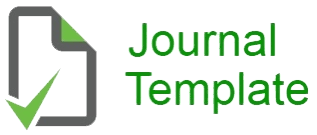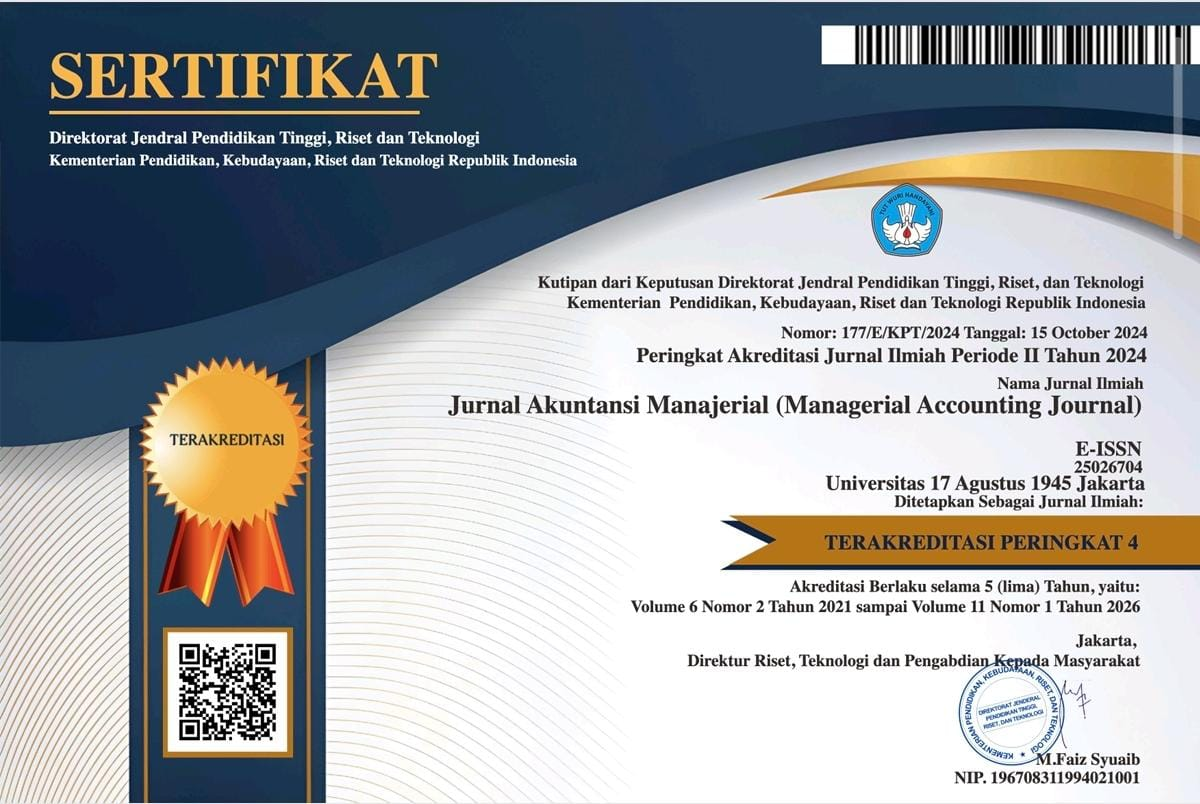- Focus and Scope
- Section Policies
- Peer Review Process
- Open Access Policy
- JAM ISSN (E):2502-6704
- Publication Ethic
Focus and Scope
Jurnal Akuntansi Manajerial adalah jurnal resmi untuk publikasi ilmiah, yang memuat artikel mengenail hasil penelitian, kajian, dan pemikiran tentang Akuntansi Manajemen dan Keperilakuan, Akuntansi Keuangan dan Pasar Modal, Akuntansi Sektor Publik, Sistem Informasi Akuntansi, Etika Profesi, Pendidikan Akuntansi, Good Governance, Corporate Social Responsibility, dan Fraud and Forensic Accounting.
Journal of Managerial Accounting is the official journal for scientific publications, which contains articles on research results, studies, and thoughts on Management and Behavioral Accounting, Financial Accounting and Capital Markets, Public Sector Accounting, Accounting Information Systems, Professional Ethics, Accounting Education, Good Governance, Corporate Social Responsibility, and Fraud and Forensic Accounting
Section Policies
Articles
Peer Review Process
Kebijakan Review mencakup:
1. Hanya Manuskrip yang sesuai dengan ruang lingkup jurnal yang akan dilanjutkan ke tahap review
2. Manuskrip diserahkan kepada reviewer yang kompeten dalam bidang kajian ilmu komunikasi atau penelitian
3. terdapat masa tunggu review, selama naskah ada di reviewer, paling cepat dua hari, dan paling lama dua bulan.
4. tulisan yang telah direview akan dihasilkan keputusan, baik di revisi, ditolak atau langsung diterima
5. Hasil review tidak dapat diganggu gugat
The review policies include:
1. Only Manuscripts that fit the scope of the journal will proceed to the review stage
2. Manuscripts submitted to reviewers who are competent in the field of communication or research studies
3. there is a waiting period for the review, as long as the manuscript is in the reviewer, the fastest is two days, and the maximum is two months.
4. papers that have been reviewed will result in decisions, whether revised, rejected or immediately accepted
5. The results of the review cannot be contested
Open Access Policy
This journal provides immediate open access to its content on the principle that making research freely available to the public supports a greater global exchange of knowledge.
JAM ISSN (E):2502-6704
Journal of Managerial Accounting is the official journal for scientific publications, which contains articles on research results, studies, and thoughts on Management and Behavioral Accounting, Financial Accounting and Capital Markets, Public Sector Accounting, Accounting Information Systems, Professional Ethics, Accounting Education, Good Governance, Corporate Social Responsibility, and Fraud and Forensic Accounting
Publication Ethic
To maintain the quality of manuscript and avoid publishing violation / plagiarism in the process of publishing, the editorial board establishes scientific publication ethics. The publication ethics rules apply to writers/authors, editors, reviewers, and journal/editorial managers. The publication ethics refers to The Committee on Publication Ethics (COPE).
Author Ethics
1. Reporting; Authors must provide information about the process and result of their research to the editor honestly, clearly, and thoroughly, and file their research data properly and safely. The manuscript must contain sufficient details and references that enable others to replicate the work. Fraudulent or knowingly inaccurate statements constitute unethical behavior and are unacceptable. The manuscript must follow journal submission guidelines.
2. Originality and plagiarism; Authors must ensure that the sent/submitted manuscript is original, written by themselves, derived from their own ideas and thoughts, and not plagiarizing other’s papers or ideas or thoughts. Authors are strictly prohibited from changing the cited reference names to other’s names.
3. Multiple or Concurrent Publication; Authors should not submit the same manuscript to more than one journal at the same time. It is unethical and unacceptable behavior. Multiple publications that originate from a research project must be clearly identified and refer to the main publication.
4. Acknowledgement of Source; Authors must acknowledge and cite all used and influential data sources in the book.
5. Multiple Submission; Authors must inform the editor that the manuscript has never been submitted to another journal publisher/publication. If there is a redundancy in submitting the manuscript to another publisher, the editor will reject the submitted manuscript.
6. Author Status; Authors must inform the editor that they have competence or qualification in a certain field or expertise in accordance with publishing science, namely librarianship. The Author who submitted the manuscript to the editor is the first author (co-author) so if a problem occurs in the process of publishing, it can be resolved immediately.
7. Authorship of the Paper; Authors must describe individual contributions to their paper. The paper should be limited to those who have made a significant contribution to the conception, the design, the implementation or the interpretation of the reported study. Others who have contributed must be listed as co-author. In case the main contributors are listed as authors, those who have less contribution to research or publication are listed in the acknowledgment. Authors also ensure that they have seen and approved the submitted version of the manuscript and include their names as co-authors.
8. Fundamental Errors in the Paper; Authors must immediately inform the editor if errors are found in the paper, not only the results of the review but also of the edit. The errors include writing names, affiliations/agencies, quotes, and other writings that can reduce the meaning and substance of the paper. If that happens, the author must immediately propose improvements to the paper.
9. Disclosure and Conflicts of Interest; Authors must understand the scientific publications ethics above to avoid conflicts of interest with other parties, so that the paper can be processed smoothly and safely.
Editor Ethics
1. Publication Decisions; Based on the review report from the editorial board, editors may accept, reject, or request for modifications to the manuscript. The validation of the work in question and its importance to researchers and readers must always drive such decisions. The editors may be guided by the policies of the journal's editorial board and constrained by such legal requirements as shall then be in force regarding libel, copyright infringement and plagiarism. The editors may confer with other editors or reviewers in making such a decision. The editors must be responsible for every material they publish and must have procedures and policies to ensure the quality of them and maintain the integrity of the published notes.
2. Review of Manuscripts; Editors must ensure that they initially evaluate each manuscript for originality. The editors should organize and use peer review fairly and wisely. The editors should explain their peer review processes in the information for authors and indicate in which parts of journals are peer reviewed. The editors should use appropriate peer reviewers for papers that are considered for publication by selecting people with sufficient expertise and avoiding those with conflicts of interest.
3. Fair Play; Editors must ensure that they evaluate each received manuscript for author’s intellectual content without regard to gender, sex, race, religious belief, citizenship, etc. An important part of the responsibility to make fair and unbiased decisions is the enforcement of editorial independence and integrity principles. The editors are in a strong position by making decisions about publication, which is crucial that this process is as fair as possible.
4. Confidentiality; Editors must ensure that information regarding the author's submitted manuscript must be guarded. The editors critically assess any potential violation of data protection and patient confidentiality.
5. Disclosure and Conflicts of Interest; Editors do not use unpublished materials for their own research without the express written consent of the author. The editors do not involve in manuscript decisions that they have conflicts of interest.
Reviewer Ethics
1. Objectivity and Neutrality; Reviewers must be honest, objective, unbiased, independent, and only take a side with scientific truth. The process of manuscript reviewing is expressed professionally without discriminating gender, sex, business side, ethnicity, religious belief, race, intergroup, and citizenship of the author. The reviewers must state their views clearly with supporting arguments.
2. Confidentiality; Each manuscripts received for review must be treated as confidential documents. They must not be shown to or discussed with others except as authorised by the editor.
3. Promptness; Any selected reviewers who feel unqualified/uninterested in reviewing the manuscript or do not have sufficient time to review should immediately notify the editor and withdraw from the planning process.
4. Accuracy; Reviewers must respond within a reasonable time frame. The reviewers only agree to review the manuscript if they are reasonably certain that they can return the review within the proposed or mutually agreed time frame, and inform the journal immediately if they require an extension. In case the reviewers find it impossible to complete a manuscript review within the exact time, the information must be communicated to the editor so that it can be sent to another reviewer.
5. Acknowledgement of Sources; Reviewers should ensure that the reference/ text citation is appropriate and credible (accountable). If errors or irregularities are found in the writing of reference/text citation, they must immediately inform the editor so the author can improve according to the notes from the reviewers. The reviewers must also state to the editor if there are substantial similarities or overlaps between the under consideration manuscript and any other published articles.
6. Peer- review effectiveness; Reviewers must respond to editor’s submitted manuscript and work according to the specified peer-review time (maximum 2 weeks). In case that a reviewer finds it impossible to complete a manuscript review within the allotted time, they must inform the editor so that the manuscript can be sent to another reviewer.
7. Disclosure and Conflict of Interest; Privileged information or ideas obtained through review process must be kept confidential and not used for personal advantage. Reviewers should not consider manuscripts in which they have conflicts of interest resulting from competitive, collaborative, or other relationships or connections with any of the authors, companies, or institutions connected to the papers.






